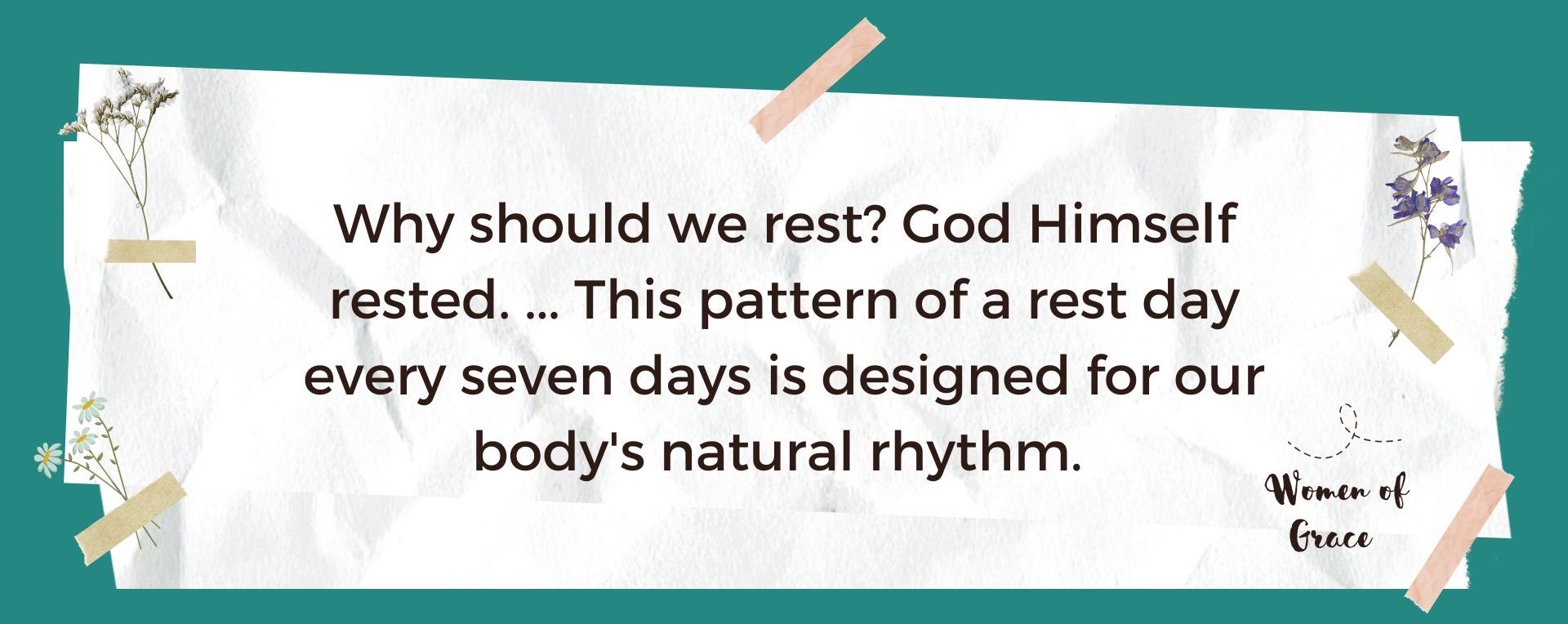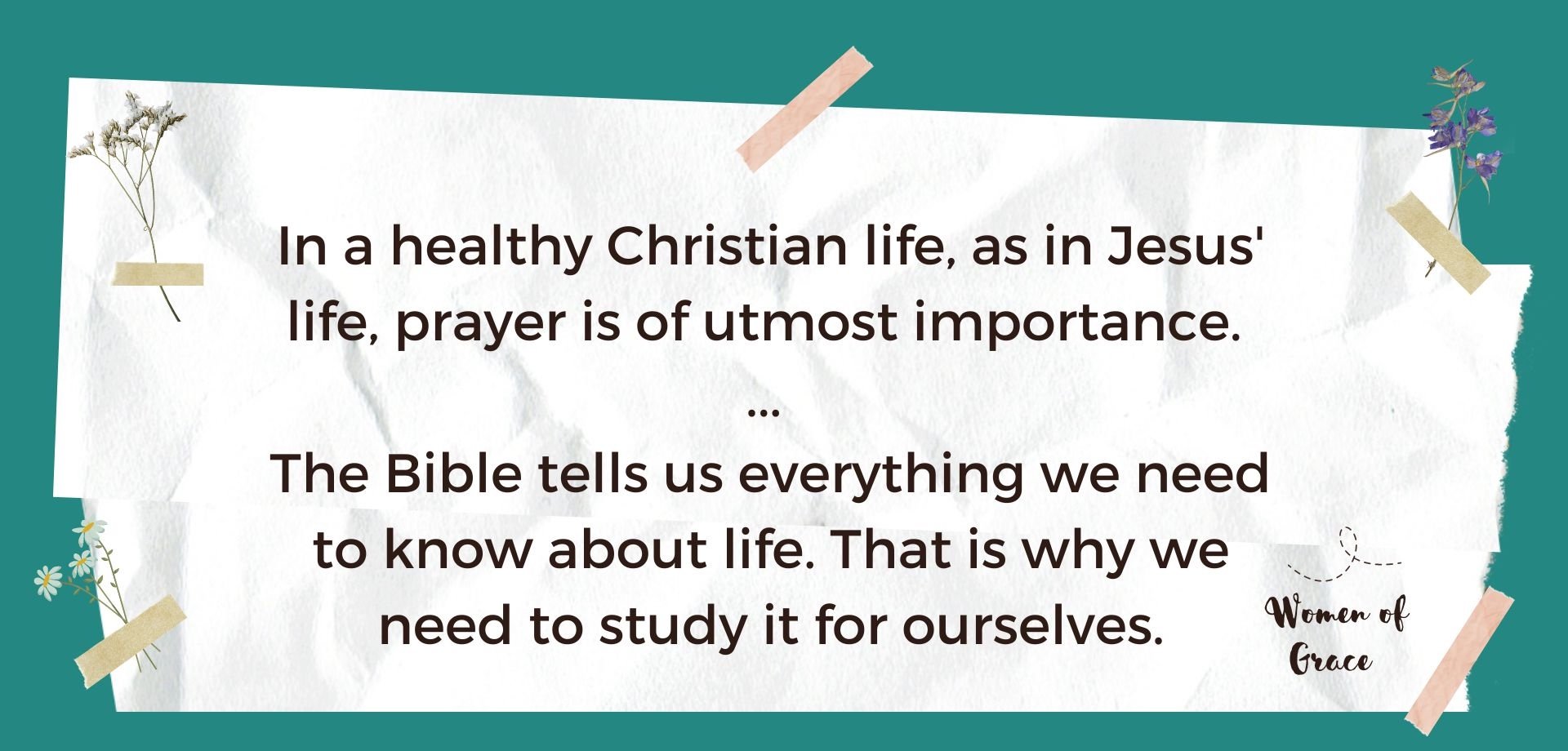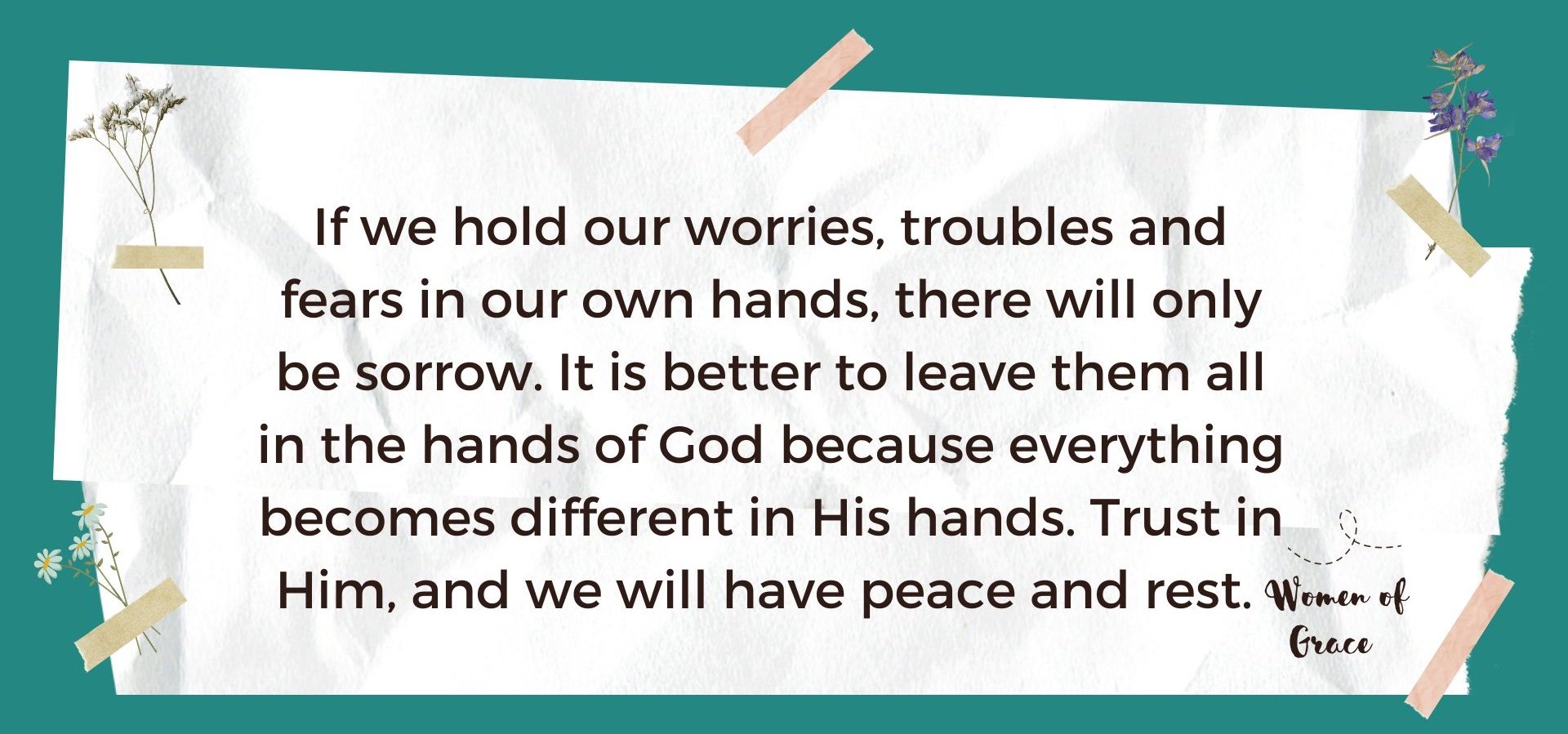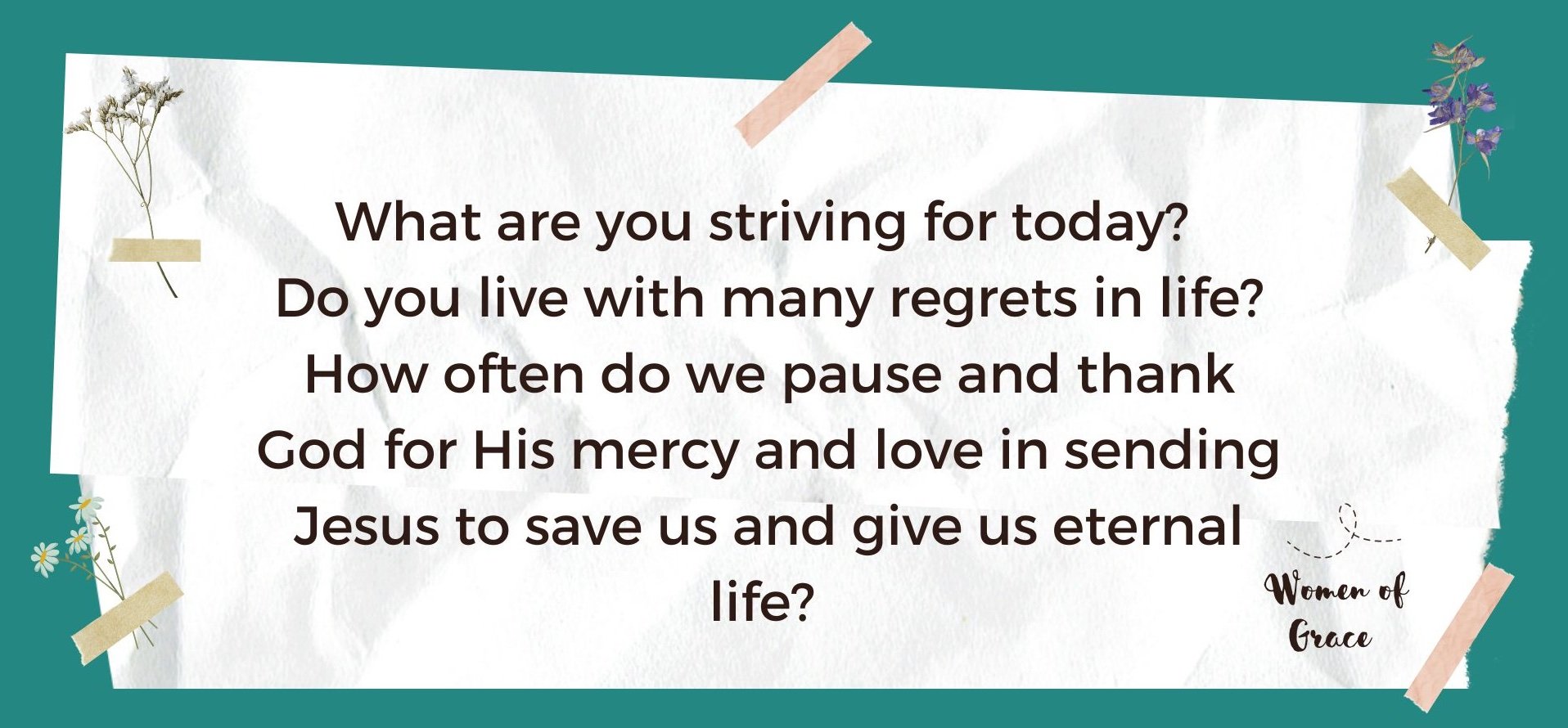Finding and Cultivating Rest in God (Part 2)
This was originally a breakout session by Chan Yoke Meng at the Women of Grace event on 14 May 2022. This is an edited version of her transcript and is the second of two parts. The first part can be found here.
We have considered the what, when, who and where of rest in the first part. In this part, we will consider why and how we can rest.
Why should we rest?
Why should we rest? God Himself rested. In Exodus 20:11, we see how God's example of rest after six days of creation is the pattern He had set up for the Jews. Although Christians are not under the same covenant of the Old Testament law, the early church adopted the same pattern, meeting on the first day of the week. This pattern of a rest day every seven days is designed for our body's natural rhythm.
Rest also allows us to be refreshed (Ex 23:12). Mark 2:27 reminds us that the Sabbath was made for man. And we all know the consequences of not getting the rest we need and setting aside time each week for Sabbath. It will surely affect us physically, emotionally, mentally and spiritually.
How do we find and cultivate rest in God?
We finally reached the how, which makes all that we have said so far practical. Here are six ways to start us off.
(1) Pray
Communicate regularly with this God who is unchanging. God's word in Psalm 37:5 and James 5:16 speaks of the importance of prayer. As a church, we've recently learnt how to pray using the ACTS model, and the prayer booklet that we have compiled is a helpful devotional that goes through this framework.
We also see how even Jesus prayed before ministry. Prayer was a big part of of Jesus' life. In Luke 22:39, we read of how Jesus went out as usual (or as the ESV puts it, "as was His custom") to the Mount of Olives, where the Garden of Gethsemane was located. Jesus went there to pray. John in John 18:1-2 also confirms the garden as a favourite retreat, well before the week of His death.
In a healthy Christian life, as in Jesus' life, prayer is of utmost importance. As we build intimacy with God in prayer, He shares His heart with us. He communicates His love for us, but also gives us our marching orders.
Let us examine our hearts. Is there pride, craving to be noticed and praised, a lack fo love for friends, irritability, a feeling of unease, no peace? If so, we've become overly busy and are neglecting prayer.
(2) Study God's Word and pay heed to it
The Bible was written so that anyone who wants to know who God is and how they are to live in a way that pleases Him can read it and find out. God desires to bring us into an intimate relationship with Himself and wants to be a Father to us. In order to have that relationship, however, God has to talk to us. He wants to explain to us who He is and how we can be brought into a close, wonderful relationship with Him.
He also wants us to understand the blessings of a life of obedience to His Word and the consequences of disobeying Him. And He wants us to know the truth about life and what is going to happen in the future. The Bible tells us everything we need to know about life. That is why we need to study it for ourselves.
In Psalm 119:105, it tells us that God's Word is a lamp to our feet, and a light to our path. It is in God's Word that we gain wisdom, knowledge and understanding. From it, we learn good judgment, discernment and warnings as well as His promises to us.
Jeremiah 6:16a gives us an image of travellers who are lost, stopping to inquire about the right way they once knew before they wandered so far off it. This is not an appeal to the upholding or maintenance of tradition, but to the inherited revelation of the covenant, of the Word of God that the Israelites have abandoned.
Have you wandered off from the paths of righteousness? It is time to come back to the Word of God. We are not just to pay attention to the Word but to order our lives according to it. By means of God's Word, we set our minds and spirits upon heavenly things and set aside our daily business in order to rest in the grace of God.
(3) Trust
Isaiah 26:3-4 tells us that trusting Him in a covenantal relationship frees us from the bondage of worry and anxiety. It is commonly said that "in the hands of God, everything is different" and here are two examples. For example, five loaves and two fishes in my hands can only make a number of tuna sandwiches, but the same items in Jesus' hands fed 5000. Again, nails in my hands can only be used to bind things together. The nails in the hands of Jesus Christ brought salvation to the world.
If we hold our worries, troubles and fears in our own hands, there will only be sorrow. It is better to leave them all in the hands of God because everything becomes different in His hands. Trust in Him, and we will have peace and rest.
Jeremiah 17:7-8 gives us a promise, that the man who trusts in the Lord, whose trust is in the LORD is blessed. But, if asked, can we name the promises of God? Perhaps, it's timely to try this activity: List down all the promises of God from Scripture, together with the Bible references. How many can you list? And more importantly, what value do you place on the Word of God? Do you believe God will do what He says?
(4) Be content
Are you like the typical Singaporean, aspiring for the 5Cs? Do you struggle with wanting a bigger home or a fancier car?
What is discontentment? It could look like just wanting more and more things without appreciating what you already have. It could also look like dissatisfaction about your lo in life and thinking that your life should turn out better than what it is today.
This was a problem right from the beginning. Adam and Eve had a paradise home in the Garden of Eden, and their needs were lavishly provided for by God but they became discontent with their situation. They wanted to eat the fruit from the tree of the knowledge of good and evil. Their discontentment set them on the path of sin, death and judgment. Today, the voices of the flesh, the world and the devil are just as active in feeding our discontent as they were in the Garden of Eden.
What are you striving for today?
(5) Don't look back
There is a short story about the former British Prime Minister, David Lloyd George, who had a habit of closing doors behind him. When asked by his friend why he had to do it, George replied, "I've been closing the door behind me all my life. ... When you close the door, you leave everything in the past behind, whether it is a good achievement or a frustrating mistake, you can then start anew again."
Do you live with many regrets in life? Paul urged us in Philippians 3:13-14 to "forget what lies behind and to strain forward to what lies ahead" and to "press on toward the goal for the prize of the upward call of God in Christ Jesus".
(6) Be thankful
We often conclude our requests with a "thank you" without even thinking about it. How often do we really mean it, to show our appreciation for the person who spends time and effort to fulfil our requests! Some of us don't even say thank you, maybe we feel that we deserve the service because we paid for it or because we feel it is the duty of the person to help us.
I'm sure we all feel good when we receive appreciation for the things we do for others. I used to be a teacher, and I love to obtain the notes from students on Teachers' Day. Once, I received eight roses from a student for the eight distinctions she obtained for her O levels. The ones that really made my day are from those that I always go after to hand up their homework or whom I chasten for copying their homework.
In Luke 10, we are told of the healing of ten lepers. Yet out of the ten, only one returned, and we are also told that he was a foreigner, a Samaritan. He was probably thankful for Jesus' healing because he did not think he deserved it.
How often do we pause and thank God for His mercy and love in sending Jesus to save us and give us eternal life? Psalm 50:23a and 1 Thessalonians 5:18 continue to remind us to thank God! Some of us may also be familiar with this old Christian song:
Thank you Lord, for saving my soul;
Thank you Lord, for making me whole;
Thank you Lord, for giving to me;
Thy great salvation so rich and free!
When we spend time offering thanksgiving to the Lord, we will appreciate more His grace, mercy and love for us and will have less opportunity to be discontent.
--
Other articles in this series and related articles:




